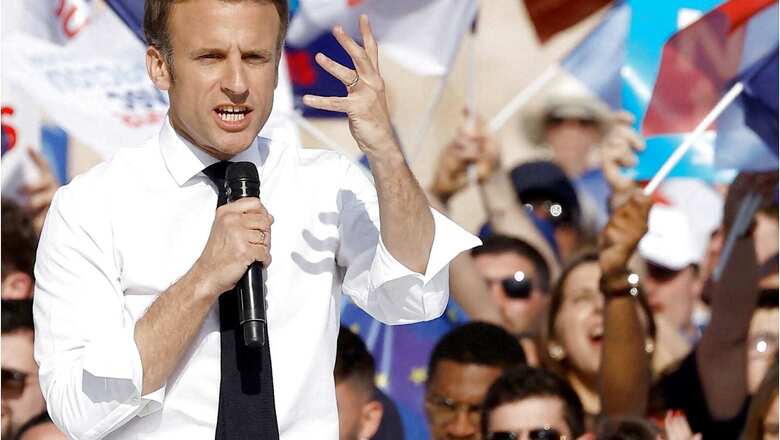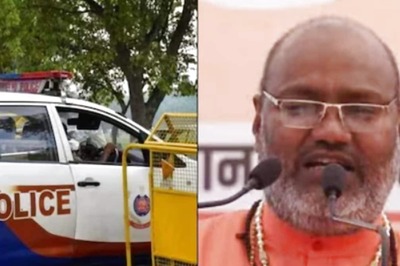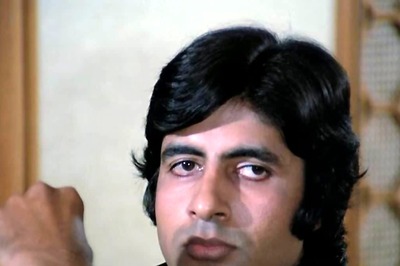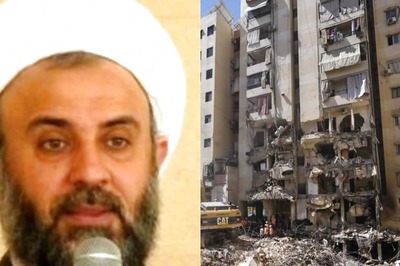
views
The controversy over alleged derogatory remarks against Prophet Mohammed by former BJP spokesperson Nupur Sharma has escalated dramatically. The entire controversy started with Sharma suggesting that she was receiving death threats over her comments. However, the Gulf nations soon got involved. Qatar, Kuwait and Iran summoned Indian envoys over Sharma’s remarks. Pakistan and the Organisation of Islamic Conference (OIC), too, condemned remarks by BJP leaders.
The Indian government had two choices — hit back at countries like Qatar, which themselves have a terrible human rights track record or simply defuse tensions in order to salvage India’s friendly relations with the Middle East. The government and the BJP evidently chose the latter. While India’s envoys in Qatar and Kuwait stated that “strong action” was taken against those who have made the derogatory remarks, the BJP itself said it is “strongly against any ideology which insults or demeans any sect or religion” and “does not promote such people or philosophy”. The party has also suspended Nupur Sharma and expelled Naveen Kumar Jindal after their remarks on Prophet Mohammed were condemned by several Gulf countries.
India’s close partners, the UAE, the Maldives and Saudi Arabia, too, have joined the chorus of Islamic countries expressing concern about the recent remarks. It is quite possible that there are extremist and fringe elements within these countries that are forcing their governments to escalate the Prophet remarks issue. What India and the BJP are currently facing could therefore be a consequence of such extremism in the Middle East and other parts of the world.
However, India isn’t the only country to face such a backlash from West Asia. There is already a precedent of such sudden wave of excessive criticism against French President Emmanuel Macron in 2020. France’s case was all the more sensitive because it involved the beheading of Samuel Paty, a middle schoolteacher, by a radicalised Chechnya-born teenager.
Earlier in 2015, two armed radicals had barged into the offices of French satirical weekly newspaper Charlie Hebdo in Paris. The two gunmen ended up killing 12 people for publishing allegedly derogatory cartoons of Prophet Mohammed. Yet, French resilience had led to Charlie Hebdo republishing the same cartoons five years later to show solidarity and strength in face of extremist attacks.
Macron had responded to Paty’s killing with the promise to de-radicalise the French society. The French President had said Islam was “in crisis all over the world” and had even expressed support for the caricatures of Prophet Mohammed that had apparently abetted Samuel Paty’s murderer. The caricatures were even projected onto government buildings in France as Macron pledged support towards values of freedom of speech and expression, and democracy.
Macron’s efforts to kick-off a de-radicalisation campaign had led to bitter resentment from the Islamic world. Turkish President Recep Tayyip Erdogan had then questioned Macron’s mental health, ultra-right groups in Pakistan had demanded expulsion of the French Ambassador, and mass protests had emerged in several Muslim countries including Libya and Bangladesh.
To make things worse, the prosperous Arab countries too had pushed back against France. French products faced boycott threats from some shops in Qatar, Jordan and Kuwait. French beauty and haircare items, in particular, faced severe backlash from the Arab societies even as an online outrage was mounted against Macron over his crackdown against radical elements.
Yet, the Macron administration did not cave in. Despite all the pressure from the Arab world and other Islamic nations, Macron kept talking about “Islamist separatism” in France and the need to enact tougher laws for countering it. The French President remained defiant about upholding his country’s secular and democratic values.
Make no mistake, Macron did face a wave of resentment from the Western liberal order too, even though he originally belonged to the same tribe. The US, for instance, expressed concern about a draft French legislation that proposed tighter rules against religion-based education, polygamy and online hate speech.
To amplify such issues, the English-speaking liberal media also remained unduly critical of France’s anti-radical measures and its effort to uphold free speech against religious extremism.
On its part, Paris, however, kept insisting that the draft legislation was a “law of freedom” and not anti-religion or anti-Islam. At the expense of being dismissed as Islamophobic and repressive, Macron remained clear about combating religious fundamentalism and enabling emancipation.
In fact, Macron’s stubbornness is what has made him popular in France. Despite all the diplomatic stand-offs that he had to face, he got re-elected as the French President only recently.
Back home in India, the present dispensation and the ruling party are facing pressure from similar extremist elements located abroad. It is also facing some sort of diplomatic nudge from the Gulf partners on the issue of remarks about Prophet Mohammed. However, what France and Macron had to face was far worse. They had to suffer a cocktail of terror killings, torrent of criticism from the Arab world, uncouth remarks from radicalised regimes like Pakistan and Turkey, and a concerted campaign by the English-speaking global media.
Yet, France has shown that backing off on the issue of free speech doesn’t have to be the only option. Major economies have deep economic interests tied with the Gulf countries. So, the Arab leaders try to exploit that advantage. Yet, there is a need to draw a clear line and ensure that issues of hate speech and freedom of expression are governed by the domestic legal system instead of being handled according to the sensitivity of extremist minds in other parts of the world.
Akshay Narang is a columnist who writes about international affairs and developments in the defence sector. The views expressed in this article are those of the author and do not represent the stand of this publication.
Read all the Latest Opinions here



















Comments
0 comment